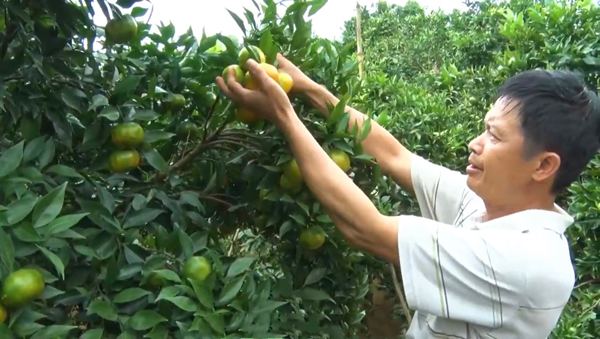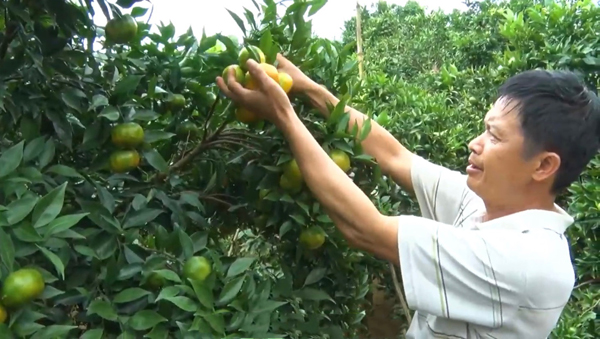
(HBO) - A project on boosting connectivity in the sale of the Nam Son tangerine has been carried out in Van Son commune since the beginning of 2019. Stakeholders in the connections have benefited from packaging and financial assistance to introduce their specialty at festivals and fairs. The participating households have also received training and guidance in the application of VietGAP and food safety standards, as well as support in tracking label usage, trade promotion and advertising.
 A
farmer in Van Son commune of Tan Lac district harvests the Nam Son tangerine
grown in the 2019 – 2020 crop. The variety has proved profitable.
A
farmer in Van Son commune of Tan Lac district harvests the Nam Son tangerine
grown in the 2019 – 2020 crop. The variety has proved profitable.
Developing the Nam Son tangerine production under
value chains has helped created a stable market, raise farmers’ income, and
supply safe and high-quality fruits for consumers. Locals’ intensive farming
skills have also been improved thanks to training in sci-tech application and
application of VietGAP standards, thereby promoting safe agricultural practices
and local farm produce’s competitiveness.
Besides, the project has been implemented on the
tangerine area that is bearing fruit, which did not change the status of land
and water resources or pollute the environment.
Recognised as a collective trademark by the
Intellectual Property Office of Vietnam (the Ministry of Science and
Technology) and meeting VietGAP standards, the Nam Son tangerine has gained an
increasingly firm foothold and won over consumers’ trust.
Farmers’ awareness has been gradually improved,
leading to more application of sci-tech advances to cultivation. Parties
involved in the project have also fulfilled their roles in product marketing.
As a result, the tangerine has secured stable sales and had its standing raised
in agricultural production. Buyers of the Nam Son tangerine are mostly from
Thai Nguyen, Son La, Ha Noi and Thanh Hoa.
The project has been implemented at a total cost
of 815 million VND (nearly 35,000 USD). With an output of 20 tonnes per ha and
prices of 20,000 – 30,000 VND per kg of fruit, farming households now earn an
average income of 300 – 350 million VND per ha, which is expected to reach 400
– 450 million VND per ha this year./.
According to data from the Hoa Binh Provincial Party Committee, the industrial production index for the first six months of 2025 is estimated to have increased by 20% compared to the same period last year. This marks the highest year-on-year growth rate for this period since 2020.
In the first six months of 2025, Hoa Binh province’s export turnover was estimated at 1.145 billion USD, marking an 18.11% increase compared to the same period in 2024. Import turnover was estimated at $ 804 million, a 17.15% increase, which helped the province maintain a positive trade balance.
The lives of the ethnic minority farmers in Tan Lac district have gradually improved thanks to the new directions in agricultural production. This is a testament to the collective strength fostered through the professional associations and groups implemented by various levels of the district’s Farmers’ Union.
With the motto the "product quality comes first,” after nearly one year of establishment and operation, Muong village’s Clean Food Agricultural and Commercial Cooperative, located in Cau Hamlet, Hung Son Commune (Kim Boi district), has launched reputable, high-quality agricultural products to the market that are well-received by consumers. The products such as Muong village’s pork sausage, salt-cured chicken, and salt-cured pork hocks have gradually carved out a place in the market and they are on the path to obtaining the OCOP certification.
In the past, the phrase "bumper harvest, rock-bottom prices" was a familiar refrain for Vietnamese farmers engaged in fragmented, small-scale agriculture. But today, a new spirit is emerging across rural areas of Hoa Binh province - one of collaboration, organisation, and collective economic models that provide a stable foundation for production.
Maintaining growing area codes and packing facility codes in accordance with regulations is a mandatory requirement for agricultural products to be eligible for export. Recently, the Department of Agriculture and Environment of Hoa Binh province has intensified technical supervision of designated farming areas and packing facilities to safeguard the "green passport" that enables its products to access international markets.



 A
farmer in Van Son commune of Tan Lac district harvests the Nam Son tangerine
grown in the 2019 – 2020 crop. The variety has proved profitable.
A
farmer in Van Son commune of Tan Lac district harvests the Nam Son tangerine
grown in the 2019 – 2020 crop. The variety has proved profitable.